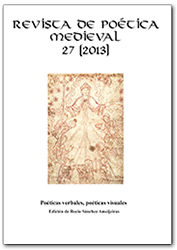«Poetica verbale e figurativa delle due città note sul Firenze, BML, PLUT. 12.17»
DOI:
https://doi.org/10.37536/RPM.2013.27.0.52980Resumen
Resumen: Quest’articolo sottolinea la dimensione poetica delle due città agostiniane, civitas Dei e terrena (o diaboli), per poi esaminare il suo diveso trattamento in sede verbale sia in sede figurativa. Come termine di comparazione è preso come esempio un celebre manoscritto miniato de De civitate Dei (Plut. 12.17). In accordo tanto con il trattato agostiniano quanto con la sua ricezione medievale, l’articolo offre nuova e originale interpretazione delle quattro tavole miniate che aprono questo manoscritto.Palabras clave: Agostino. De civitate Dei. Civitas terrena. Civitas diaboli. Saeculum. Canterbury. Polisemia. Equivocità. Poetica verbale. Poetica figurativa. Antitesi.
Abstract: This article points out the poetic dimension of the two cities defined by S. Augustine, the civitas Dei and the civitas terrena (or diaboli); then it considers the different treatment of such a dimension in the verbal and in the visual code. In order to develop this comparison the author examines a well-known illuminated manuscript of the De civitate Dei (Plut. 12.17; Canterbury? 1120-1130). In keeping with the Augustinian treatise as well as with its medieval reception, the article offers a new and original insight of the four depicted folios, which open this manuscript.
Keywords: Augustin. De civitate Dei. Civitas terrena. Civitas diaboli. Saeculum. Canterbury. Polisemy. Ambiguity. Verbal poetry. Visual poetry. Antithesis.
Descargas
Métricas alternativas
Descargas
Cómo citar
Número
Sección
Licencia
Las opiniones y hechos consignados en cada artículo son de exclusiva responsabilidad de sus autores. La Universidad de Alcalá no se hace responsable, en ningún caso, de la credibilidad y autenticidad de los trabajos.
Los autores conservan los derechos sobre sus trabajos, aunque ceden de forma no exclusiva los derechos de explotación (reproducción, edición, distribución, comunicación pública y exhibición) a la revista. Los autores son, por lo tanto, libres de hacer acuerdos contractuales adicionales independientes para la distribución no exclusiva de la versión de la obra publicada en la revista (por ejemplo, alojarlo en un repositorio institucional o publicarlo en un libro), siempre que medie un reconocimiento de su publicación inicial en esta revista.
Los trabajos se publican bajo los términos estipulados en la Licencia de Atribución-NoComercial-CompartirIgual 4.0 Internacional Creative Commons (CC BY-NC-SA 4.0) que permite a terceros compartir la obra bajo las siguientes condiciones:
Atribución — Usted debe dar crédito de manera adecuada, brindar un enlace a la licencia, e indicar si se han realizado cambios. Puede hacerlo en cualquier forma razonable, pero no de forma tal que sugiera que usted o su uso tienen el apoyo de la licenciante.
NoComercial — Usted no puede hacer uso del material con propósitos comerciales.
CompartirIgual — Si remezcla, transforma o crea a partir del material, debe distribuir su contribución bajo la misma licencia del original.










